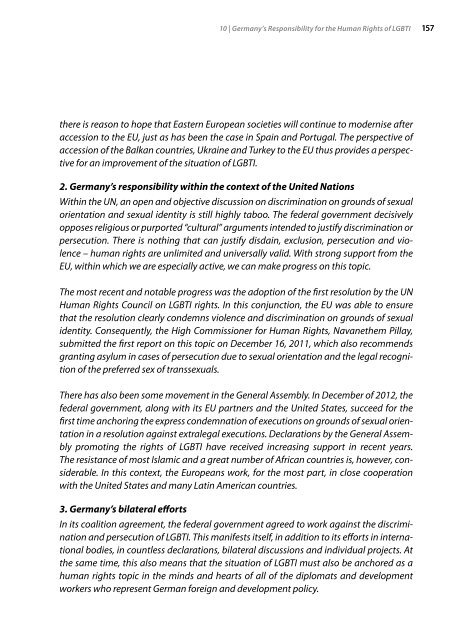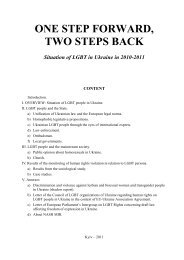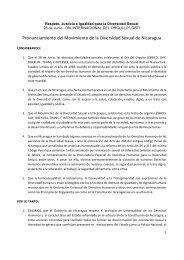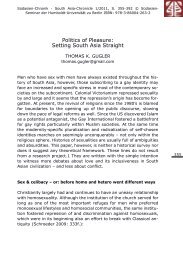Vom Verbot zur Gleichberechtigung - Hirschfeld-Eddy-Stiftung
Vom Verbot zur Gleichberechtigung - Hirschfeld-Eddy-Stiftung
Vom Verbot zur Gleichberechtigung - Hirschfeld-Eddy-Stiftung
Sie wollen auch ein ePaper? Erhöhen Sie die Reichweite Ihrer Titel.
YUMPU macht aus Druck-PDFs automatisch weboptimierte ePaper, die Google liebt.
10 | Germany’s Responsibility for the Human Rights of LGBTI 157<br />
there is reason to hope that Eastern European societies will continue to modernise after<br />
accession to the EU, just as has been the case in Spain and Portugal. The perspective of<br />
accession of the Balkan countries, Ukraine and Turkey to the EU thus provides a perspective<br />
for an improvement of the situation of LGBTI.<br />
2. Germany’s responsibility within the context of the United Nations<br />
Within the UN, an open and objective discussion on discrimination on grounds of sexual<br />
orientation and sexual identity is still highly taboo. The federal government decisively<br />
opposes religious or purported “cultural” arguments intended to justify discrimination or<br />
persecution. There is nothing that can justify disdain, exclusion, persecution and violence<br />
– human rights are unlimited and universally valid. With strong support from the<br />
EU, within which we are especially active, we can make progress on this topic.<br />
The most recent and notable progress was the adoption of the first resolution by the UN<br />
Human Rights Council on LGBTI rights. In this conjunction, the EU was able to ensure<br />
that the resolution clearly condemns violence and discrimination on grounds of sexual<br />
identity. Consequently, the High Commissioner for Human Rights, Navanethem Pillay,<br />
submitted the first report on this topic on December 16, 2011, which also recommends<br />
granting asylum in cases of persecution due to sexual orientation and the legal recognition<br />
of the preferred sex of transsexuals.<br />
There has also been some movement in the General Assembly. In December of 2012, the<br />
federal government, along with its EU partners and the United States, succeed for the<br />
first time anchoring the express condemnation of executions on grounds of sexual orientation<br />
in a resolution against extralegal executions. Declarations by the General Assembly<br />
promoting the rights of LGBTI have received increasing support in recent years.<br />
The resistance of most Islamic and a great number of African countries is, however, considerable.<br />
In this context, the Europeans work, for the most part, in close cooperation<br />
with the United States and many Latin American countries.<br />
3. Germany’s bilateral efforts<br />
In its coalition agreement, the federal government agreed to work against the discrimination<br />
and persecution of LGBTI. This manifests itself, in addition to its efforts in international<br />
bodies, in countless declarations, bilateral discussions and individual projects. At<br />
the same time, this also means that the situation of LGBTI must also be anchored as a<br />
human rights topic in the minds and hearts of all of the diplomats and development<br />
workers who represent German foreign and development policy.











